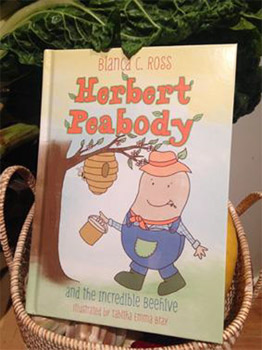Herbert Peabody and the Incredible Beehive

Herbert Peabody and the Incredible Beehive
In the upcoming illustrated children's book, Herbert Peabody and the Incredible Beehive, author and small-time farmer Bianca C. Ross tells a captivating tale to help children understand the important role that bees play in our food chain, and connect them with where their food comes from.
Herbert Peabody is a farmer who grows fruit and vegetables in a big vegetable patch at Mulberry Tree Farm. When he discovers that his new neighbour, Bee, is having trouble finding enough pollen to supply her family's hive, Herbie decides to lend a hand to find more flowers. But there's another concern: The Voice That Belongs to Nobody has taken up residence in the once-grand mansion of Huffelton, scaring away anyone who ventures inside the neglected, lonely grounds. Will Herbie be able to find more flowers in tome for Bee's hive? And can he solve the mystery behind the voice in Huffelton House?
Melbourne-based Bianca C. Ross is a small-time farmer with almost a decade of international marketing experience in advertising agencies and ten years brand management in food companies across children's products. She observed a disconnect between children and their understanding of where food comes from, so she conducted her own research amongst parents about the creation of a character that teaches the importance of vegetables in a fun way. After a positive response, Herbert Peabody was created. Herbert Peabody and the Incredible Beehive is the second book in the series, following the success of Herbert Peabody and his Extraordinary Vegetable Patch.
Herbert Peabody and the Incredible Beehive
Farinet Pty Ltd
Author: Bianca C. Ross
Illustrator: Tabitha Emma Bray
ISBN: 9780987595515
RRP: $18.95
Interview with Bianca C. Ross
Question: What inspired the stories of Herbert Peabody?
Bianca C. Ross: After a marketing career in children's dairy and juice products, I moved into advertising, working in Europe and Asia. When I returned to Australia, we were in the midst of a food revolution. Cooking and growing food were high on the agenda, and whilst there was a great selection of information for adults, there wasn't much for children. And I thought I'd do something about it.
Question: Why did you want to inform children about where food comes from?
Bianca C. Ross: I feel it's important to appreciate the effort needed to grow our food and share a connection with the land. Studies show that children who are involved in growing their own food are far more likely to try different fruits and vegetables. My father and my grandma were raised on farms, and growing up we had a backyard veggie patch. Watching food grow is fascinating, and eating your own produce is super rewarding. I wanted to share that joy and entice children to become involved.
Question: How did you use your faming background to write Herbert Peabody and the Incredible Beehive?
Bianca C. Ross: I've met incredible farmers who host events at their farms in an effort to connect people with where their food comes from. The people who attend leave with a renewed appreciation for the work farmers do and the effort it takes to produce food.
I wrote the Herbert Peabody book series to share farmers stories and engage children with the important topics of farming and food production.
Question: Can you talk us through how this book helps children understand the important role that bees play in our food chain?
Bianca C. Ross: Herbert Peabody is a farmer who grows fruit and vegetables at Mulberry Tree Farm.
When he discovers that his new neighbour, Bee, is having trouble finding enough pollen to supply her family's hive, Herbie decides to lend a hand to find more flowers.
With the mysterious disappearance of the local historic gardens, Herbie's problem solving journey helps children learn about the importance of pollen and it's crucial role in producing food. And, Herbie's rhymes throughout the story engage children in a fun way to learn.
Interview by Brooke Hunter
MORE



